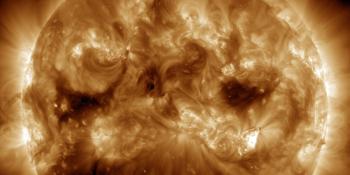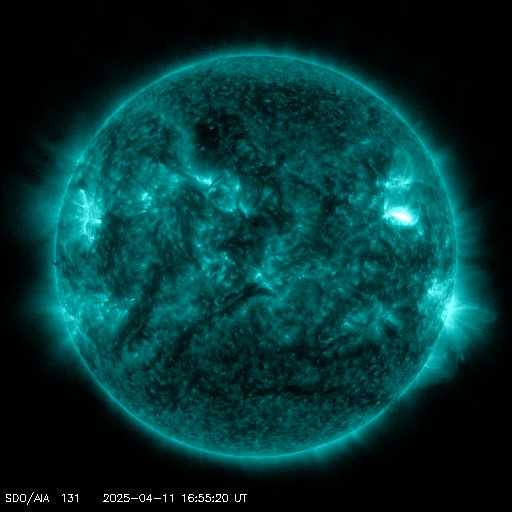Viewing archive of Tuesday, 23 May 2023
Daily bulletin on solar and geomagnetic activity from the SIDC
Issued: 2023 May 23 1238 UTC
SIDC Forecast
Solar flares
M-class flares expected (probability >=50%)
Geomagnetism
Active conditions expected (A>=20 or K=4)
Solar protons
Quiet
| 10cm flux | Ap | |
|---|---|---|
| 23 May 2023 | 160 | 013 |
| 24 May 2023 | 162 | 015 |
| 25 May 2023 | 160 | 019 |
Solar Active Regions and flaring
Solar flaring activity remained at moderate levels over the past 24 hours. The strongest activity was an impulsive M1.9-flare, start time 13:30 UTC, peak time 13:37 UTC, end time 13:58 UTC on May 22nd, produced by NOAA AR 3312 (beta). This region produced a few low C-class flaring as well. The remaining multiple C-class flaring was produced by NOAA AR 3311 (beta-gamma-delta), which has slightly reduced its size and trailing sunspots, but continues to be the most complex sunspot group on the visible solar disc. NOAA AR 3305 has now fully rotated behind the west limb, followed by NOAA 3308 (beta). NOAA AR 3314 has decayed into plage, while a new faint regions has developed to the south of NOAA AR 3311. Active regions NOAA 3310 (beta) and NOAA 3313 (alpha) have been mostly stable and quiet. The solar flaring activity is expected to remain at low to moderate levels over the next days with some chances for isolated X-class flaring from NOAA AR 3311.
Coronal mass ejections
A slow faint coronal mass ejection (CME) was first observed in the LASCO/C2 chronograph imagery after 14:00 UTC on May 22nd. The CME is related to the impulsive low M-class flaring from NOAA AR 3312 with an accompanying on disc dimming and a type II radio burst detected around 13:40 UTC. The bulk of the CME is expected to miss Earth, but a weak glancing blow could arrive late on May 25th. No other Earth-directed CMEs have been detected in the available coronagraph imagery.
Solar wind
Over the past 24 hours the solar wind parameters (ACE and DSCOVR) Solar wind parameters reflected the influence of a high speed stream (HSS) arrival from a negative polarity coronal hole. The solar wind velocity reached 688 km/s. The interplanetary magnetic field remained slightly elevated with a maximum value of 10.43 nT and a minimum Bz of -9.41 nT. The B field was predominantly in the negative sector (directed towards the Sun). The solar wind conditions are expected to remain elevated over the next days with the ongoing HSS passage.
Geomagnetism
The geomagnetic conditions over the past 24 hours were globally unsettled to active. Quiet to active conditions were observed locally over Belgium. Mostly quiet to active geomagnetic conditions are expected over the next 24 hours with remaining chances for isolated minor storms under the ongoing high speed stream influence and due to a possible glancing blow ICME arrival late on May 25th.
Proton flux levels
Over the past 24 hours the greater than 10 MeV GOES proton flux was at nominal levels and is expected to remain so over the next days.
Electron fluxes at geostationary orbit
The greater than 2 MeV electron flux has reached the 1000 pfu threshold and remained close to it in the interval of 14:00 and 17:30 UTC on May 22nd. The greater than 2 MeV electron flux is currently approaching the 1000 pfu threshold and is expected to exceeded in the upcoming hours. The greater than 2 MeV electron flux is expected to periodically exceed the 1000 pfu threshold in the upcoming days. The 24h electron fluence was at nominal levels and is expected to be at the boundary of nominal to moderate levels at fist and then increase towards moderate levels over the next days.
Today's estimated international sunspot number (ISN): 126, based on 14 stations.
Solar indices for 22 May 2023
| Wolf number Catania | /// |
| 10cm solar flux | 162 |
| AK Chambon La Forêt | 026 |
| AK Wingst | 023 |
| Estimated Ap | 026 |
| Estimated international sunspot number | 131 - Based on 24 stations |
Noticeable events summary
| Day | Begin | Max | End | Loc | Strength | OP | 10cm | Catania/NOAA | Radio burst types |
|---|---|---|---|---|---|---|---|---|---|
| 22 | 1331 | 1337 | 1343 | N18E24 | M1.9 | SF | 110 | --/3311 | VI/2III/2II/2 |
| 22 | 1330 | 1337 | 0655 | ---- | M1.9 | --/---- | VI/2 |
Provided by the Solar Influences Data analysis Center© - SIDC - Processed by SpaceWeatherLive
All times in UTC
Current data suggests there is a slight possibility for aurora to appear at the following high latitude regions in the near future
VorkutaLatest news
Latest forum messages
More topicsSupport SpaceWeatherLive.com!
A lot of people come to SpaceWeatherLive to follow the Sun's activity or if there is aurora to be seen, but with more traffic comes higher server costs. Consider a donation if you enjoy SpaceWeatherLive so we can keep the website online!

Latest alerts
17:09 UTC - Solar flare
Moderate M1.08 flare
16:51 UTC - Radio Blackout
Minor R1 radio blackout in progress (≥M1 - current: M1.04)
Thursday, 10 April 2025
23:00 UTC - Geomagnetic activity
Active geomagnetic conditions (Kp4) Threshold Reached: 22:47 UTC
20:45 UTC - Hemispheric Power Index
The OVATION model predicts the Hemispheric Power Index to reach 50GW at 21:37 UTC
01:45 UTC - Geomagnetic activity
Active geomagnetic conditions (Kp4) Threshold Reached: 01:41 UTC
Space weather facts
| Last X-flare | 2025/03/28 | X1.1 |
| Last M-flare | 2025/04/08 | M1.5 |
| Last geomagnetic storm | 2025/04/06 | Kp5 (G1) |
| Spotless days | |
|---|---|
| Last spotless day | 2022/06/08 |
| Monthly mean Sunspot Number | |
|---|---|
| March 2025 | 134.2 -20.4 |
| April 2025 | 141.4 +7.2 |
| Last 30 days | 137.9 +0.4 |





